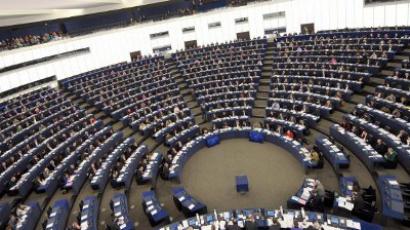'Capitalism to be replaced with Socialism 2.0'
The future of humanity depends on whether “too big to fail” sectors of the economy are taken under public control, creating a step-up socialist model, believes Peter Mertens, Belgian politician and author, the head of the Workers’ Party of Belgium.
The root of the ongoing crisis is overcapacity in the production, Mertens believes. He says the policy of creating artificial consumption was a stopgap measure and it has failed.Europe is at a crossing point, Mertens told RT. The choices are, keep the euro at the expense of renouncing national sovereignties to live in an authoritarian German-led Eurozone, or split up into several conglomerates. Yet there is a third way, when strong mass movements find political translation to go for something like a socialist Europe with public banking and energy systems and true democracy.RT: The title of your book is “How dare they?” Who are they?Peter Mertens: After the crisis of 2008 we asked ourselves what has changed finally after this crisis. Because I remember in 2008 there were lots of declarations, for example from Sarkozy but also Obama, political leaders that said with the financial sector and financial capitalism – we are going to take really radical measures to change. And I wanted to see four years after these declarations what has changed. And I think basically on the financial level there is nothing changed at all. And if there is something changed it’s on the contrary those who are responsible for the crisis of 2008 who have received more power and even more financial resources.
So the most important figure I think in the book is the study of Credit Swiss, the Swiss investment bank, that says that half a percent of the adult population of the world now have more than 38 percent of all the wealth on Earth.
RT: “They” refers to what? Leaders? Obama, Sarkozy or the bankers? Who is the “they”?PM: It’s an open question but in each case there is a little upper class. In Europe and in the USA, that is composed of industrial capitalists, CEO’s of large enterprises; of bankers, and also of some politicians – it’s a circle, the system of upper class from people who know each other.RT: We’ve seen the banking system in trouble again. We have Austrian banks and even German banks in trouble, while they were supposed to be safer. Spain is in big trouble. If the problems persist despite the solutions offered by leaders in the past, does that mean that fundamentally the root of the problem has not been solved?PM: I think the root of the problem is in the productive sector because there are a lot of voices that are saying that it’s only the problem of the financial sector but in my vision you have this problem of overcapacity in production that is present today, like in the automobile factories. And traditionally what did the economy do to resolve this problem that there is more capacity from production than capacity of consumption? They close factories, they get restructuring and so on to demolish productivity capacity. But the neo-liberal way was also another way to tackle the crisis.
And this way was to create artificial consumption. And they did it by reducing taxes for the richest people in the USA, afterwards in Germany and everywhere in Europe. They did it to give the middle class its credit cards – three, four, five credit cards.
The system existed but they enlarged it to have artificial consumption and they did it finally to also give to people predatory loans to sell them houses when they knew from the very beginning that these people could never pay them back.And the problem of the banking and the banking crisis of 2008 was that small banks disappeared and the bigger banks stayed and now we have this problem called “too big to fail” syndrome.RT: This “too big to fail” reasoning holds everybody hostage, economies and politicians. At what point is this reasoning is not enough?PM: So in order to change things I think we need pressure from the base, we need popular movements, we are going to in my opinion see a Europe with a very large number of social conflicts. You are seeing it already, the beginning of it, the beginning of the spring of the peoples. We are going to need it.RT: It is true we’ve seen a lot of social upheavals across Europe. Are you’re saying that only when these social upheavals reach critical mass will there be any change all?PM: Europe is at a crossing point of three possible ways. There is the way from Frankfurt, or from Berlin. This is more authoritarian Europe and they want to save the euro by authoritarian measures. By taking national sovereignty to the European level, by mixing in matters like the salaries, for example, of each country, of the pensions of each country. The second way in the crossing point in my view is that Europe will separate again and that we’ll have two, three or four Europes like the strong states Germany, Holland, Austria on the one hand and middle states like France, Belgium and Luxembourg on the other hand; and then the so-called weak states. But it’s nationalism again and we’ll have conflict in Europe. And then there is the third way.
In my view if the people and mass movements are strong and if they find political translation it will be possible to go to something like a socialist Europe, a Europe of solidarity, of cooperation, where the banking system is public, where the energy system is public, where there is democracy.
RT: In your book you talk a lot about myths surrounding Greece. Why is it being misrepresented?PM: If you have the official figures everyone can look them up and everyone can see that Greek people are working more than 2100 hours a year – and that is for examples more than 600 hours a year more than in Germany, more than 500 hours a year than in Belgium. So this myth of the lazy Greek is not true. So I was asking myself why they are saying such things in the mainstream media in Germany, in Holland, in Belgium.And I think it is easy to understand because the establishment which profits from this euro story – for more than 10 years – is the German establishment and the Dutch establishment. So in creating this false conception of the Greek people you can say: no, it’s not a problem of economy, it’s not a problem of the Eurozone, it’s a problem of lazy Greeks.RT: What about the euro project? Some argue that whether the euro is needed or not in pursuit of a United Europe is moot. The fact that it was chosen as a single currency years ago means that the decision has been made and there is no turning back. Do you agree with this?PM: So you have in Europe this organization called the “European round table of industrialists” and they are behind the scenes of the most powerful organization which has pushed this concept of one euro since the end of the 80’s in politics. From the beginning, European monetary union was conceived as a concept to create a big competitive Europe that could compete with the US, with Japan, etc, etc. And they knew very well that at the beginning of the euro there were these large inequalities in Europe. So they knew it and they said: oh it’s not a problem, we are going to create a system of convergence – that was the treaty of Maastricht, and under the norms of Maastricht they said we are going to level up all the countries to prepare for 2002, the introduction of the euro. And now here we are 10 years later and we see that the inequalities in Europe, they weren’t leveled up at all. But this euro created more inequalities than ever in the last 50 years in Europe.RT: The country in focus – Spain has been prescribed with the same solution as Greece and Ireland.PM: I think that really the financial sector all over Europe should be transformed radically and we need a public sector in finance all over Europe. Because now they can bailout Spain but it’s a very short-term measure because structurally it isn’t changing a lot and I hope they will help short-term. But you also need measures for the long-term in Europe.Einstein said once: stupidity, what is stupidity? Stupidity is to do something twice and think there will be another result. They said it would solve the crisis in Greece, now for five years Greece has been in recession, becoming worse and worse. And now they are going to take the same program to Spain and they are magically expecting another result.RT: What does the socialism 2.0 you talked about in your book exactly mean?PM: I think this competitive system has to change seriously and
I think we are going to need again a socialist system where there is a large public sector and a system where there is also large democratic control and I think that for all those sectors that are too big to fail for humanity, like the banking sector, like energy sectors, if it is too big to fail for the future of humanity and the world you need to have public control.
There are two sources they say in Belgium, for wealth. And the father of wealth is the work force: people are working and thinking and creating things. This is the father of wealth. Then you have the mother of wealth, they say, this is nature. This capitalist system has a problem with its own father and its own mother. They are exploiting the workforce and they are exploiting nature. Socialism 2.0 in my view is a system that is not exploiting its mother and its father but respecting the workforce and respecting nature.














